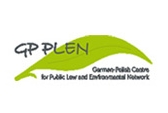|
  
EU Environmental Impact Assessment Directive - challenges and perspectives in the light of the past experiences and the recent proposal for amendment
23 May 2013 (Thursday)
8.15 - 9.00 - Registration
9.00 - Opening
I. Introductory session (9.30 - 11.15)
- EC proposal for EIA Directive amendment (Stephanos Ampatzis, Cohesion Policy and EIA Unit, DG ENV, European Commission) - [file ppt]
- EIA Directive amendment – Member States’ views (Vytautas Kalpokas, Ministry of Environment, Lithuania, Lithuanian Presidency) - [file pdf]
- EIA Directive amendment – European Parliament’s views (Sergiusz Urban, Wierciński, Kwieciński, Baehr) - [file pdf]
Discussion / questions
Coffee break (11.15-11.45)
Session II. EIA in environmental policy (11.45 - 13.15)
- Environmental assessment in Europe–genesis, historical developments and trends (Jerzy Jendrośka, Opole University, Environmental Law Center and Jendroska Jerzmanski Bar & Partners. Environmental Lawyers) - [file pdf]
- EIA as a tool for sustainability (Francesco la Camera, Ministry of Environment, Italy) - [file pdf]
- Place of EIA in development control (Piotr Otawski, General Directorate for Environmental Protection, Poland) - [file pdf]
Discussion / questions
Lunch break (13.15-14.15)
Session III. Scope of assessment (14.15 - 16.00)
- Concept of “project” (Magdalena Bar, Jendrośka Jerzmański Bar & Partners. Environmental Lawyers) - [file pdf]
- Screening procedure - criteria for screening, justification (Hendrik Schoukens, Ghent University) - [file ppt]
- EIA and compliance with environmental quality standards (Eckard Rehbinder, professor emeritus, Frankfurt University) - [file pdf], [file pdf]
- Alternatives (Gerd Winter, Bremen University) - [file pdf]
Discussion / questions
Coffee break (16.00-16.30)
Session IV. EIA and other forms of assessment (16.30 - 18.30)
- Need for streamlining various assessments (Stephanos Ampatzis, Cohesion Policy and EIA Unit, DG ENV, European Commission) - [file pdf]
- EIA and SEA (Pavel Černý, Ekologicky Pravni Servis, Brno) - [file pdf]
- EIA and habitat assessment (Nicolas de Sadeleer, FUSL-Brussels, Academy of Louvain) - [file pdf]
- EIA and the assessment under Water Framework Directive (Marcin Pchałek, Ochrona środowiska i działalność inwestycyjna - Konsulting) - [file pdf]
- EIA and waste management (Marek Górski, Łódź University and Szczecin University; Magdalena Michalak, Łódź University) - [file pdf]
Discussion / questions
24 May 2013 (Friday)
Session I - cont. (9.00 - 9.30)
- EIA Directive amendment – European Economic and Social Committee views (Josef Zboril, EESC Rapporteur) - [file pdf]
Session V. EIA: citizen’s rights and transboundary procedure (9.30 - 11.15)
- Public participation (Teresa Weber, Justice and Environment, Vienna) - [file pdf]
- Access to justice (Jan Darpö, Uppsala University and Chair of Aarhus Convention Access to Justice Task Force) - [file pdf]
- Transboundary procedure (Ludwig Krämer, EU Aarhus Center, Brussels) - [file pdf]
- Forthcoming UNECE Recommendation on Public Participation (Jerzy Jendrośka, consultant UNECE, Opole University and Environmental Law Center) - [file pdf]
Discussion / questions
Coffee break (11.15-11.45)
Session VI. Judicial review, quality control and monitoring (11.45 - 13.15)
- Scope of judicial review (Marc Clément, Administrative Court of Appeal of Lyon) - [file pdf]
- Accreditation of EIA experts and other tools for assuring quality control (Luc Lavrysen, Ghent University and Constitutional Court, Belgium) - [file pdf]
- Quality control and monitoring (Jiri Dusik, Integra Consulting, Prague/Hong Kong, former IAIA Board member) - [file pdf]
Discussion / questions
Lunch break (13.15-14.15)
Session VII. Effectiveness of EIA (14.15 - 16.00)
- Effectiveness of EIA in the light of practical experience (Martin Fuhr, University of Applied Sciences, Darmstadt; ELNI) - [file pdf]
- Mythology, Deception, and Secrecy - How to Reform Some Unacceptable EIA Practices in in Europe and Beyond (John Bonine, Oregon University and E-Law) - [file pdf]
- The effectiveness of environmental impact assessment in integral sustainable development implementation (Kazimierz Równy, professor emeritus, Polish Academy of Sciences) - [file pdf]
- Smarter EIA system through a deeper harmonization? (Ismo Pölönen, University of Eastern Finland) - [file pdf]
Discussion / questions
Coffee break (16.00-16.30)
Session VIII. National experience with EIA (16.30 - 18.30)
- EIA Directive as a model for EIA in Eastern Europe (Andriy Andrusevych, Resource & Analysis Center “Society and Environment”, Lviv) - [file pdf]
- EIA in Korea (Nankyoung Moon, Korea Environment Institute, Seoul) - [file pdf]
- EIA Directive as a model for EIA in Near East and Africa (Eike Albrecht, Brandenburg University of Technology Cottbus) - [file pdf]
Discussion / questions
End of the conference (expected at 18.30)
18.30 - ELNI General Meeting - office of the Jendrośka Jerzmański Bar i Wspólnicy law firm; Pl. Solny 16, office 406, IV floor
25 May 2013 (Saturday)
10.00 - 13.00 - City Guided Tour (free of charge)

Koszty tłumaczeń podczas konferencji współfinansowane są z projektu POPT.03.01.00-00-304/12
ze środków
Unii Europejskiej w ramach Programu Operacyjnego Pomoc Techniczna 2007-2013
|
|












